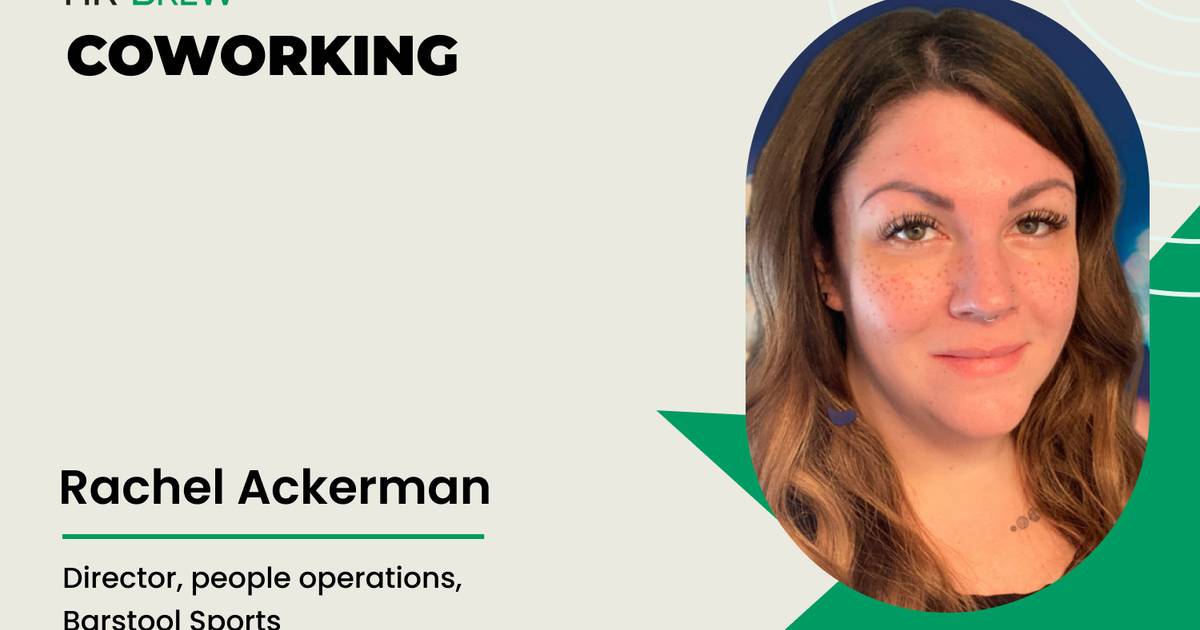
Here’s this week’s edition of our Coworking series. Each week, we chat 1:1 with an HR Brew reader. Want to be featured in an upcoming edition? Click here to introduce yourself.
Rachel Ackerman worked on payroll, comp, and benefits for the Mets—yes, the iconic New York City baseball team—for seven years toward the beginning of her career. Then, after stints in the healthcare and tech field, she found her way back to sports (media) and was hired at Barstool Sports as its director of people operations.
“Barstool is definitely a different breed of company,” she said, likening it to “a little bit of the Wild Wild West” and a “pirate ship.”
Ackerman first rolled up her sleeves to tackle the company’s compliance issues, organize new HR processes, and overhaul its HR tech stack. With a year under her belt, she is eager to keep at it.
“Alright, what’s next? What can I dig my teeth into?” she said, of tackling bigger challenges at the David Portnoy-owned media company. “How are we going to retain our people? How are we going to attract? People want to come work for us because we’re Barstool, but how are we going to keep them in the seats?”
Ackerman said she’s eyeing mobility and career development frameworks now, cementing pay banding, and “listening for what our people are asking for.”
This interview has been edited for length and clarity.
What’s the best change you’ve made at work?
At Barstool, I came into quite a messy systems set-up. I was able to review the current tech stack that was in place, make recommendations to leadership, and then proceed with making changes to our systems and benefits that had an amazing impact on our people team and our employees. We created a one-stop shop for most people-related tools and tasks. We were able to use some of the savings we created to offer additional benefits/perks.
Quick-to-read HR news & insights
From recruiting and retention to company culture and the latest in HR tech, HR Brew delivers up-to-date industry news and tips to help HR pros stay nimble in today’s fast-changing business environment.
What’s the biggest misconception people might have about your job?
That we’re only here to do the company’s bidding. Are we going to be best friends? No. But I am here to support our employees in their day-to-day at work and ensure they have everything they need to support their life outside the job. My goal is to be a resource to our employees and provide them with as much transparency and honesty as I can so they feel comfortable coming to [me].
What’s the most fulfilling aspect of your job?
Being able to offer resources and opportunities for our employees to encourage their personal well-being, growth, and development—from things like gym memberships and subsidized mental healthcare to a decent parental leave and PTO policies.
What trend in HR are you most optimistic about? Why?
AI. It’s a hot topic, and I see the pros of utilizing AI in my workspace. We’re already using it in various ways in some of the tools we have, but I know there will be many more applications in the future and I’m cautiously optimistic that we’ll be able to incorporate AI [without] eliminating the number of jobs in HR that people think may be impacted.
What trend in HR are you least optimistic about? Why?
RTO. Stop it. Can we get a grip and fully look at the data that supports the performance that comes with encouraging and supporting hybrid workforces and flexible work arrangements? We need to remember when a lot of our work practices and laws came to be and why, and recognize how much work has changed over the years. I think we need to take a better look at what our sister countries are doing in supporting four-day workweeks, flexible work arrangements, and paid leave policies.
